Many people in Russia grow or want to grow grapes in their backyard. But this culture is not very suitable climate of most of our country. Through the breeders of the world, now there are quite a few varieties that can withstand such difficult conditions. In this article we will tell about cold-resistant varieties.
Table of contents
Benefits of cold-resistant grape varieties
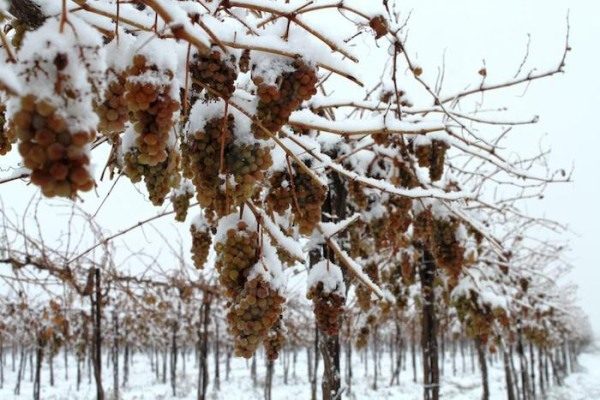
The first and main advantage of frost-resistant varieties is clear from the name - These representatives tolerate our harsh winters relatively easily. Also, the berries are more dense and, accordingly, transportable. Winter-hardy varieties are well suited for making wines. What varieties withstand adverse conditions?
Most frost-resistant for arbors and arches
Lydia
The most beloved and common is Lydia. Bred by Williams Prince, a breeder from the USA from the variety Isabel and got the name Isabella Pink there. It tolerates very cold weather. The clusters are small. The berries are mostly pink. Have an unusual, very pleasant taste. Suitable for gazebos and arches.
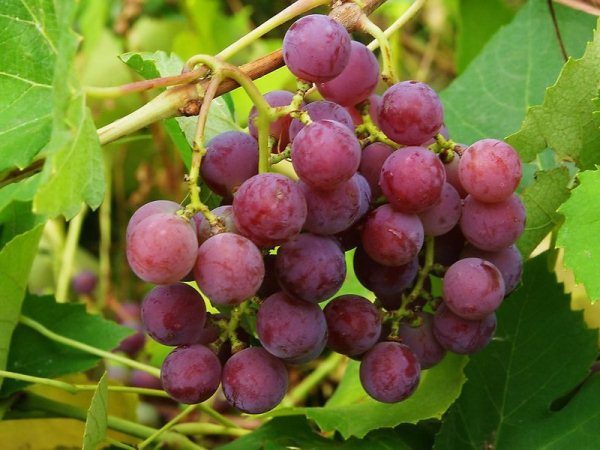
Benefits:
- excellent frost resistance;
- self-pollination;
- resistant to powdery mildew and mildew;
- transportability
The only significant disadvantage is instability to phylloxera.
Aleshenkin
Aleshenkin - early dessert grapes, uncovered. Also called Alesha or number 328.It has great taste and beautiful view - large clusters up to two kilograms berries have the shape of a cone, yellow-green color.
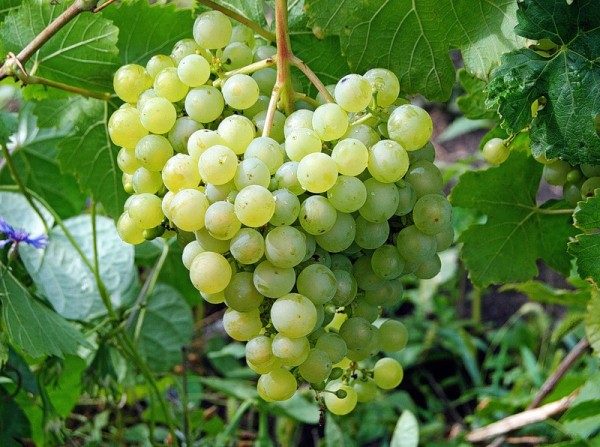
Benefits:
- very early;
- does not require special care and special agricultural technology;
- cuttings root well;
- good productivity without top dressing;
- few seeds in the berries;
- great taste;
- the berries are kept on the vine with frost down to -25 ° C.
Disadvantages:
- the underground part is not frost resistant;
- berries need growth stimulant, otherwise it is likely to be a pea.
Lady fingers
It has a unique shape of berries, which are similar to female fingers. Hence the name. Official name - Husayne White. Large sweet berries are grouped in large clusters. The taste is excellent, sweet, with hints of sourness. Most often used for making raisins, as it does not have pits.
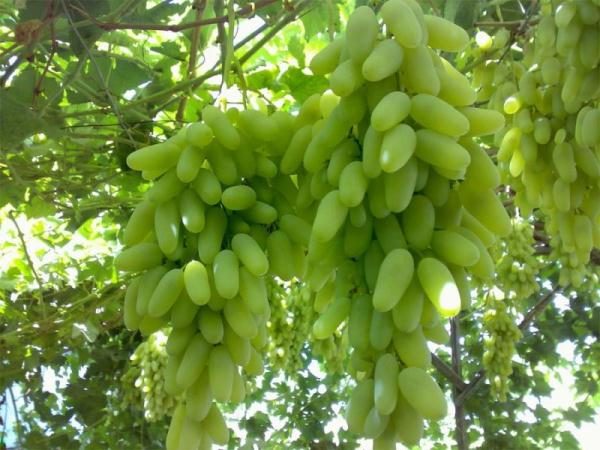
This is a grape variety originally from Central Asia. Very picky about the sun and heat. It has a long period of ripening, therefore it is not suitable for central Russia. It is grown by a few winegrowers. With good care and favorable weather, as well as periodic feeding, you can still get a good harvest.
Benefits:
- high yield;
- strong growth;
- excellent taste;
- lack of pits.
Disadvantages:
- long ripening period - 130-160 days;
- crop instability by season;
- long term engraftment cuttings;
- low frost resistance - up to -11 ° С;
- This grape is very fond of wasps and birds;
- extremely susceptible to various diseases - fungus, oidium, powdery mildew.
If all these shortcomings are not scared away from landing, then you should carefully approach the choice of place. It should be protected from drafts, there was a lot of sun. The soil should be light. Groundwater should be deep - more than 2.5 meters. Also Ladies fingers need a lot of free space - no less 2-2,5 meters each way. If the year was rainy, then it is necessary to remove the spoiled berries in time. Otherwise they will suffer healthy fruits. -
Tukai
Table grapes Tukay was created in the Research Institute of Viticulture and Winemaking Ya.I. Potapenko in Novocherkassk. The grade turned out unpretentious and frost-resistant. Tukay love for a rich harvest and a long shelf life of berries that are very tasty.
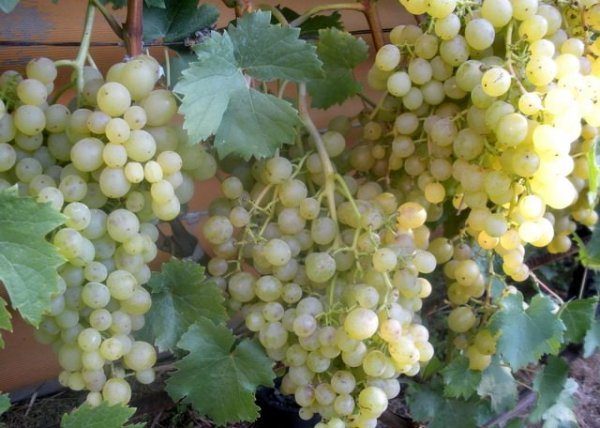
Benefits:
- early, in July, it is already beginning to mature;
- large clusters - up to 1.5 kilograms;
- berries are fragrant and tasty;
- has female and male flowers, therefore self-pollinated;
- fruits can be stored until spring, if you observe the temperature regime (from +1 to + 8 ° C).
Disadvantages:
- needs proper pruning, otherwise the clusters will be small;
- may be affected by felt mites.
When pruning in the spring is left 30-40 ocelli and the rest of the shoots break off manually. It is hard to get rid of the felt tick.
Cardinal
The variety obtained by crossing the grapes Queen of Vineyards and Alphonse Lavalle. Large brushes: length 18-30 cm, width - 12-20 cm. Weight - 350-500 g. Berries are large. Their weight reaches nine grams. The color of the peel is purple-red, with a waxy coating.
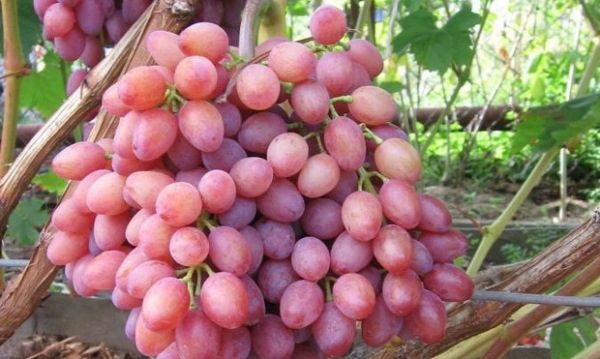
Cardinal refers to the early varieties. Ripening time is 105-110 days. Self-pollinated
Benefits:
- excellent taste and attractive appearance;
- large berries;
- suitable for long-term storage;
- good transportability.
Disadvantages:
- low disease and pest resistance;
- shedding flowers and pea in high humidity;
- the need for careful care;
- bad frost resistance.
Isabel
This variety is bred in the United States by Isabel Gibbs. Hence the name. Isabel, as well as some other American “gifts” (Colorado potato beetle, common maple), turned out to be very tenacious. He doesn’t care about the frosts of Central Russia. Also, almost not affected by any characteristic of grape diseases.
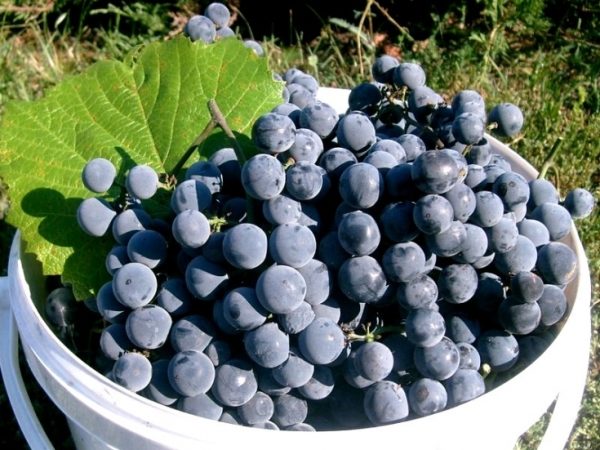
At one time there was information that Isabella was harmful, since a lot of methyl alcohol was released during the preparation of wine, but this information was later refuted.
Benefits:
- taste qualities;
- low calorie;
- high yield;
- unpretentiousness.
Disadvantage for some growers, you can call the late date of harvesting - October-November.
Rylaines Pink Seedis
Of all the varieties of Rylains described in this article, pink sidlis differs in that it has no bones. The berries are shaped like a ball, small, pink with strawberry flavor. Clusters are compact. Harvest - in mid-September.
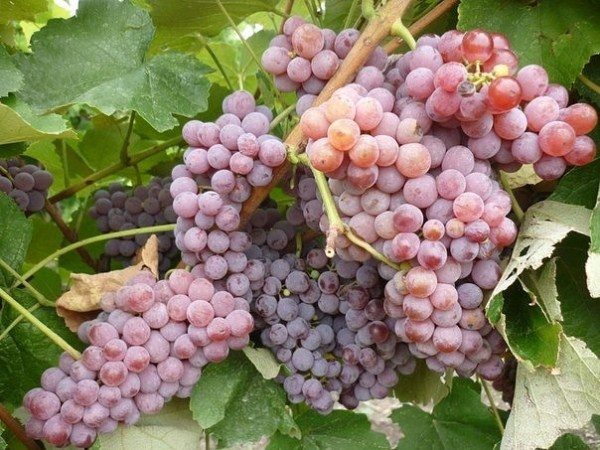
Benefits:
- lack of pits;
- high frost resistance;
- rapid growth of the vine;
- very early term of aging;
- resistance to fungal diseases;
- high content of beneficial trace elements (vitamin A, B vitamins, iron and iodine).
Disadvantages:
- during rainy weather in the ripening phase, the berries are prone to cracking;
- small fruits.
Just 200 years ago, grapes in Russia were grown only in the southern regions and slightly in the center of the country. Now it is grown in the Urals, and already in the middle lane it is distributed everywhere. But breeders do not stop in their research. And, you can be sure, many beautiful frost-resistant varieties adapted for our country will soon see the light.
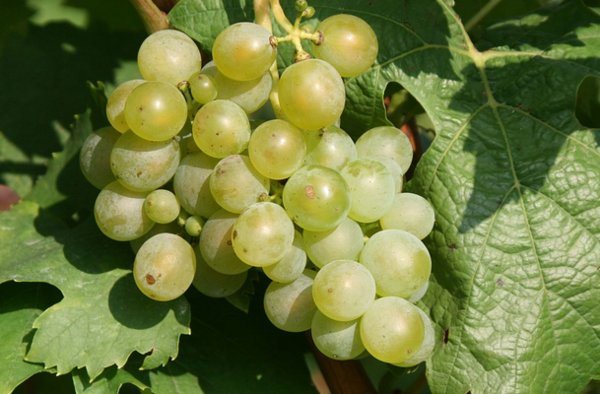
Article - the most resistant varieties. Including listed Cardinal. And at the end of the description, afraid of the cold!